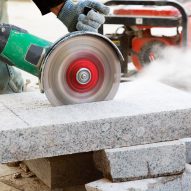Australia bans engineered stone due to silicosis risk
Australia has become the first country in the world to ban engineered stone, following rising cases of silicosis among workers who handle the material.
The ban was agreed at a meeting of Australian federal and state workplace ministers on Wednesday, and will come into place across the country from 1 July 2024.
The ban targets engineered stone, also known as agglomerated stone – a type of material made by mixing crushed stone with a resin binder.
“This is a dangerous product”
While it is valued as a durable and affordable alternative to natural stone for kitchen benchtops, the material can be dangerous while being cut because it releases a fine silica dust into the air.
Australia has recorded rising cases of the lung disease silicosis in stonemasons who have handled the product, leading it to be dubbed “the asbestos of the 2020s” by union leader Zach Smith.
“This is a dangerous product that’s known to cause the potentially fatal disease silicosis, and it has no place in our workplaces,” said Queensland industrial relations minister Grace Grace in a statement following the meeting.
“The rate of silicosis illness in Australia for those working with engineered stone is unacceptable,” said her Western Australian counterpart Simone McGurk. “This prohibition will ensure future generations of workers are protected from silicosis associated with working with engineered stone.”
Ban follows report finding no safe level of silica in engineered stone
The move comes nine months after an investigation by three Australian news outlets accused supplier Caesarstone of not doing enough to warn people of the dangers of working with the material and the country’s construction union launched a campaign calling for the ban.
A subsequent report by the national policy body Safe Work Australia found that engineered stone workers were significantly over-represented in silicosis cases and were being diagnosed with the disease at much younger ages than workers from other industries, with most being under the age of 35.
It also found that the risk from engineered stone was distinct from that of natural stone due to the material’s physical and chemical composition, and that this was likely contributing to more rapid and severe disease.
The report concluded that no level of silica was safe in engineered stone and that the material should be prohibited in its entirety.
Silicosis is caused by tiny particles of silica becoming embedded in the lining of the lungs and manifests in symptoms such as shortness of breath, cough, weakness and fatigue.
The condition is life-altering and potentially fatal, with many formerly healthy young sufferers describing being unable to work or play with their kids.
Caesarstone commits to supplying Australia with “alternative products”
In response to news of the ban, Caesarstone commented that while it disagreed with the decision, it is taking the necessary steps to ensure supply of alternative materials to Australian consumers.
“The Caesarstone brand is well known in Australia and its products have earned tremendous success over the years,” said Caesarstone CEO Yos Shiran. “We are already taking steps to supply our Australian market with alternative products while maintaining our strong market presence.”
It has previously argued that its material is safe if handled correctly and that the silicosis danger was the fault of employers and work safety bodies.
Other companies including Ikea and Bunnings had already committed to phasing out the material in the Australian market.
The ban will apply to the manufacturing, supplying, processing and installing of engineered stone but not its removal, repair, disposal or minor modifications.
Australia’s workplace ministers will meet again in March 2024 to finalise details of the ban, including the transition period for contracts that have already been implemented and the precise definition of engineered stone.
The country’s Model Work Health and Safety Regulations currently exclude concrete and cement products, bricks and pavers, porcelain, ceramic tiles, roof tiles, grout, mortar and render, and plasterboard from the definition of engineered stone, but ministers have indicated that additional products would be added to the exemptions.
This may allow future engineered stone products to be exempted from the ban if there is “compelling evidence” that they can be used safely.

